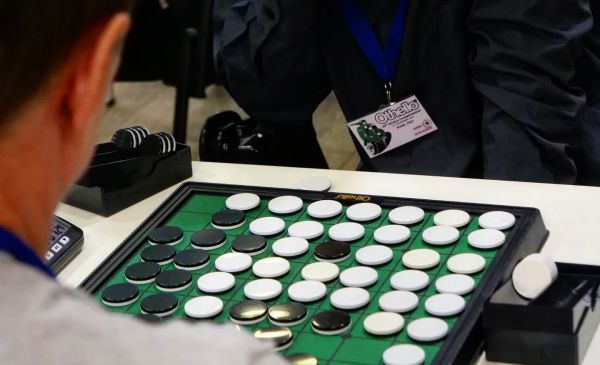Othello news
Life is an Othello game
30 November 2023Written by Carlo Affatigato

You wake up in the morning, and it's already time for important choices. They say breakfast is the most important meal of the day; similarly, your opening can decide the match. Shall I go for the standard things we all eat in the morning, or try something alternative? After all, the parallel opening is not as bad as it looks: it surely surprises your opponent, and you still have the whole game to recover that initial disadvantage. It's a shame it's disappearing from the official tournaments. Shall I follow the standard practice or try something totally new?
But most importantly, the question that we keep hearing from every player who wants to be good at this game is: Shall I commit myself and learn openings, or can I just play freely? The conventional answer is: yes, you should know openings. First, because if you don't, you'll often find players who can kill your hopes after the first ten moves. Second, because if you do, you can keep the match in good condition until the midgame, even with some advantage, even against top players. One way or another, you must survive the morning, and memory can be a good skill for the first part of your journey. However, don't make the usual mistake. Your opening book is a good ally, but don't turn it into your only strength: knowing a 30-move opening, or even a couple of complete draw sequences, is useless if your opponent understands and plays some -4, -6, even -8 move early enough. Ultimately, you'll always need strong gameplay, and it's worth practicing it separately.
That's when the midgame really happens. It's like having lunch: the moment of the day when you can diversify your destiny in infinite ways. It's pure freestyle; you can't rely on memory, it's too early to see the end, so you go by pattern recognition, quiet moves, and general guidelines. You control lines, you preserve mobility, and if you are really inspired, you can visualize a sequence of 3 or 4 moves that can give you a local advantage, either temporary or decisive. Here, it's all about experience: if you are young, there is little you can do to deal with the variety of pure midgame against an experienced player. Sure, you can have exceptional talent, but if you don't belong to that selected group of players who can play at the top level despite their short experience, you'll have to work hard. And be patient.
Meanwhile, the clock is ticking. It's a time-limited game, so you must also manage this limitation properly. The closer you get to the evening, the more tired you may be, and a few minutes more will surely help you nail the endgame. What skills do you need to master endgames? That's mainly vision and prediction skills — something belonging to natural talents much more than anything else. You can get better by practicing with puzzles and working on concentration, but it will always be something that improves very (veery!) slowly. You try to focus on the sequences that have more probability of happening, you force yourself to count when needed, and after all that, if you still have no certainty, you trust your instinct. The more games you play, the more reliable your autopilot should be, right? Well, until you don't realize you make the same mistakes even 30 years later, after you repeatedly promised yourself to avoid them. That's also totally normal. Encouraging, isn't it?
There is no unique way to play a game, no recipe for victory, but at least you know there will always be those three phases: morning, afternoon, and evening. Opening, midgame, and endgame, each of them requiring a different set of skills. You need to be good at all of them, of course. At some point, you'll be confident enough to decide when the time for the opening is over, and you need to bring the game into the next phase. Similarly, a position will come to make you decide it's time to predict the continuation until the last move, eventually starting counting. When will all that happen precisely? It depends on your talents, your style, your attitude. And that's what will make your day different than the others. Find your way, your identity, make yourself different than the others, and that already makes it worth the effort. Results will come, eventually.
Now the game is over, it's virtually night. Maybe you did everything right and lost anyway, or you had no control over anything and managed to win. You'll study what happened later, perhaps after a good sleep. Or wait, shall we play again?




